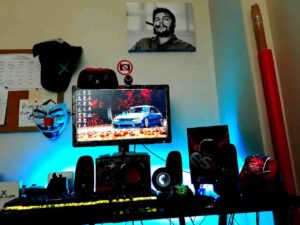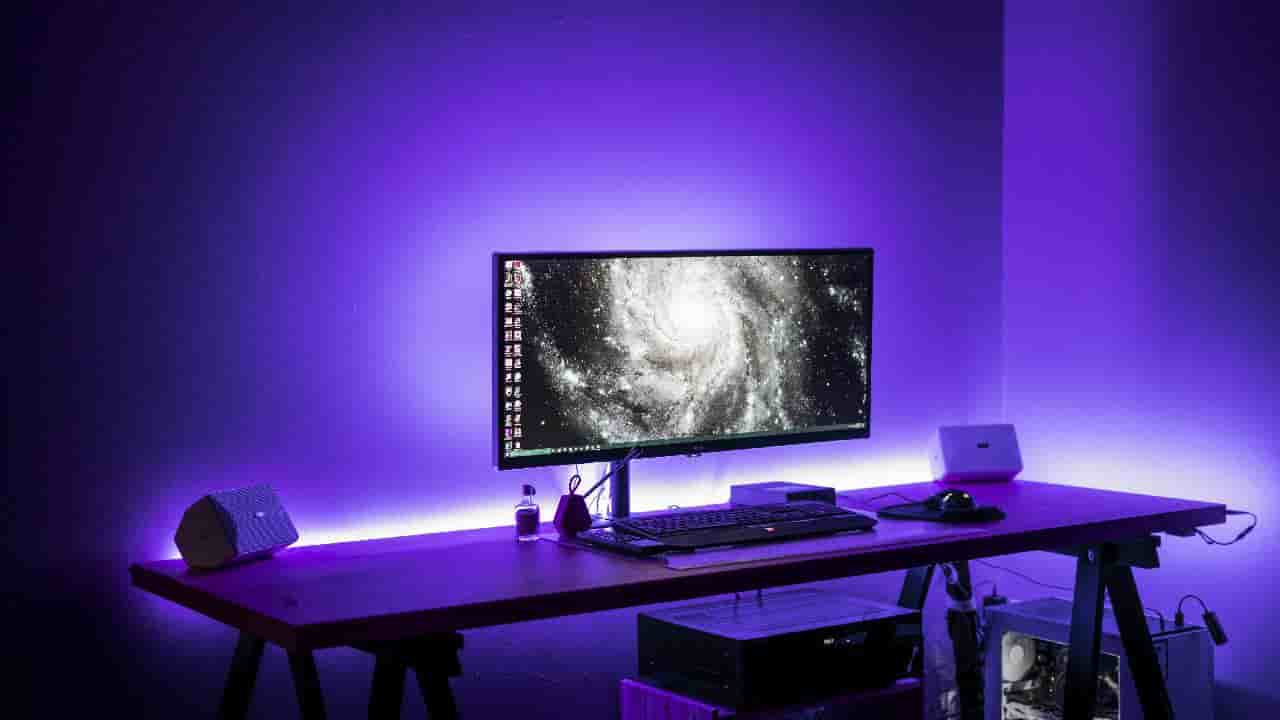While it’s possible to purchase a pre-built computer, many people choose to assemble their own computers. For those contemplating building their PC themselves, it’s essential to consider the costs involved with this process. Is it possible to save money by building your own computer?
It is initially more costly to build your own PC than pre-built computers. That is because components will need to be purchased individually before being assembled. By building your computer, you can use high-quality parts that will last longer, which can save you money in the long run.
While it can be more expensive initially than buying a pre-built PC, there are many benefits to building your computer yourself. Once we’ve outlined these advantages, we’ll give you a cost breakdown of the different computer components. This will provide you with a better understanding of the costs involved with building a PC by yourself!
Is It Cheaper To Build Your Own PC?
When it comes down to purchasing a computer, you have two main options. Firstly, you could opt to buy a pre-built computer. However, it’s also possible to build your own computer. When deliberating about which option is best for you, it’s important to keep your budget in mind.
Will it be cheaper to purchase a pre-built computer or to build it yourself? Unfortunately, the answer to this question is not as straightforward as you initially thought. When considering the cost of purchasing a computer – regardless of which route you take – it’s essential to consider the short- and long-term costs.
Initially, it will be quicker and cheaper to purchase a pre-built computer. If you need a computer urgently, buying a pre-built PC will be a better option. From the motherboard to the processor to the graphics card, computers comprise many components. Purchasing these components individually can take time, and the cost of these parts will inevitably add up.
However, purchasing a computer is a long-term investment. For this reason, it’s important to consider the long-term effects of purchasing a pre-built computer or assembling one yourself. This can help you make the right choice when deciding how you want to purchase the computer you’ll be using for the foreseeable future.

When purchasing a pre-built computer, buyers have little control over the quality of the interior components. Typically, pre-built computers focus on the included CPU (Central Processing Unit) and GPU (Graphics Processing Unit). However, these are only two components of many.
With pre-built computers, many internal components will vary in terms of quality. Due to this, buyers of pre-built computers need to repair and replace internal components more frequently than those who build their own computers. When you decide to assemble a computer yourself, you can ensure that all the parts you use are high quality.
Ultimately, this results in a computer with a build quality superior to that of pre-built computers. Due to this, building your PC yourself is considered the cheaper option in the long run. While building your own computer may cost more initially, it can still save you money. However, that’s not the only benefit of deciding to build your PC from scratch!
The Pros And Cons Of Building Your Own PC
When deciding whether or not to build a computer yourself, it’s crucial to weigh all of the pros and cons. We’ve outlined advantages and disadvantages of building your PC yourself to help you make the best choice for your computing needs.
The Pros Of Building Your Own PC
Here are the advantages of building your computer by yourself!
#1: You Can Customize Your PC To Your Needs
One of the top advantages of building your computer is being able to customize it to your needs. Nobody understands your computing needs better than yourself. If your computer needs to be able to run demanding applications, you can tailor your computer’s specs to these needs.
#2: Your PC Will Last Longer
When building a computer to meet your desired specifications, you have control over the components you use. This means that you’ll be able to research individual components to choose the best parts in terms of cost and quality. Your computer will last longer than a pre-built PC by using high-quality components.
#3: It’ll Be Easier To Fix And Upgrade Your PC
By assembling a computer, you’ll become familiar with the internal components. Due to this, you’ll be able to identify faulty components to fix them. Furthermore, the process of upgrading your PC will generally be easier for those who build their computers themselves. Being able to repair and upgrade your own computer over time is another great benefit of building it yourself!
#4: It Can Save You Money In The Long Run
While it may be more expensive initially to assemble a computer, you’ll save money down the line. With higher-quality parts, custom computers are known to last longer. This is a way how to save money as a high school student if you can build your own PC. With your ability to repair and upgrade your computer, you’ll save even more money in the long run!
The Cons Of Building Your Own PC
Here are the disadvantages of building your own computer!
#1: Building A PC Yourself Costs More Initially
As mentioned earlier, the initial cost of building a computer by yourself will be higher than purchasing a pre-built computer. For this reason, it’s important to consider your budget when deciding whether or not to assemble your computer yourself.
#2: Your Chosen Components Need To Be Compatible
When assembling your computer, the end goal is to build a functional computer according to your desired specifications. However, for your PC to be operational, you’ll need to ensure that the various parts you purchase are all compatible with one another.
For example, you want to ensure that your components can fit into your chosen computer case. You’ll also want to ensure your motherboard can support the CPU or RAM you purchase for your computer. When browsing computer parts, it’s important to keep compatibility in mind at all times!
#3: It Takes Longer To Build Your Own PC
Computers are comprised of many different components. Buying all of these different parts and assembling them will take quite a bit of time. This means that purchasing a pre-built computer is a quicker solution. In situations where a computer is urgently needed, the timeframe of assembling your computer yourself is a significant downside to consider.
#4: You Need The Right Expertise
Purchasing all the required computer parts is only one aspect of building your PC. The other aspect is, of course, to actually assemble the components. To successfully do this, you’ll need knowledge of computers and their parts to build your computer. Luckily, there are many resources to help people assemble their computers in the age of information!
Component Costs When Building Your Own PC
In this article, we’ve established that building your own computer can save you money in the long run. However, it’s also crucial to consider the costs of purchasing the different components you’ll need. You will have to know a lot about components to build a PC.

In this section, we’ll break down the various parts you’ll need and how much they each cost on average. This will help you choose between building a computer or buying a pre-built one.
#1: Case/Chassis
When building a computer, the case or chassis you use is an important consideration. Essentially, your PC case will house the various computer components you’ll be purchasing. There are different sizes available.
When choosing the right size, you’ll need to consider the motherboard you plan on using. Different case sizes will correspond to various motherboard form factors. You’ll also want to take note of a case’s graphics card length and cooling system compatibility.
How Much Will It Cost?
In terms of price, computer cases will range between $30 and $300. Generally, you’ll spend around $150 on a decent computer case.
#2: Motherboard
Choosing a motherboard is a crucial decision. After all, your choice will impact many of the other components you need to purchase. For example, your motherboard choice will determine the type of RAM you can use.
When building a PC, you’ll need to choose between an Intel or AMD motherboard. You’ll want to ensure that the motherboard you choose is compatible with the computer case you use. The most common motherboard size is ATX, which is considered full-size.
How Much Will It Cost?
In general, the cost of a motherboard will range between $25 and $250. For high-end motherboards, you’re looking at $150 and up.
#3: CPU (Central Processing Unit)
Your computer’s CPU is one of the most critical components. Ultimately, your CPU is responsible for managing the tasks running on your computer. You’ll need to purchase a CPU that is compatible with your motherboard. Intel’s CPU options are generally more expensive than AMD variants.
How Much Will It Cost?
In general, the cost of a CPU will range between $200 and $300. The cost will differ depending on the brand of motherboard you choose and how powerful the processor is. The more powerful the processor, the longer your computer will last!
#4: RAM (Random Access Memory)
On your motherboard, there will be dedicated slots for RAM sticks. This ‘Random Access Memory is used to store programs and data while they are still being processed. Your motherboard’s manual will denote how much RAM it can support. When purchasing RAM, you want to ensure you use a memory type, size, and brand that is compatible with your motherboard. This will be outlined in your motherboard’s user manual.
How Much Will It Cost?
RAM is sold in sticks. Generally, the cost of one RAM stick will range between $10 and $50. You’ll need to use multiple RAM sticks to reach the desired RAM size, whether that’s 8GB, 16GB, 32GB, or more. The cost of this will depend on the factors mentioned above, such as memory type, size, and brand.
#5: GPU (Graphics Processing Unit)
A GPU is a dedicated graphics processor that is designed to improve the way your computer handles graphics. The graphics card is crucial for gamers and those running demanding programs, such as photo or video editing software.
How Much Will It Cost?
Graphics cards are among the most expensive computer components and can range anywhere from $100 to more than $1000.
#6: Storage Device
You’ll also need to purchase a storage device to save files and programs for your computer. You’ll be able to choose between traditional hard drives (HDD), which generally offer more storage, or solid-state drives (SSD), which are more efficient and reliable. You may even want to use a combination of both!
How Much Will It Cost?
The price of storage devices varies depending on the type and overall storage space. While you may be able to buy a 1TB hard drive for $50, an SSD drive of the same size will cost at least $100 for lower-end models.
#7: PSU (Power Supply Unit)
To actually power all of your computer’s components, you’ll need to purchase a PSU. This will be your PC’s power supply unit.
How Much Will It Cost?
In terms of cost, PSU’s can range between $25 and $300. Where a power supply unit falls on this price scale will correlate with its quality. For high-end processors and graphics cards, you’ll want to purchase a PSU of at least $150.
#8: Cooling System
The cooling system you get for your computer is an important consideration. After all, your cooling system will support your processor and ensure it delivers peak performance. To adequately address functioning longevity, you will have to build your own pc with this in mind. Both air and liquid-based cooling systems are available.
How Much Will It Cost?
In general, liquid cooling systems cost more than air-based systems. While liquid cooling systems will typically cost upwards of $100, air cooling systems cost around $50 on average.
#9: Monitor
Your computer monitor is a component that ties everything together. There are many different options available on the market today. You’ll be able to choose between countless flat and curved displays of varying sizes. Various display technologies are available, such as LED and IPS displays.
How Much Will It Cost?
Due to the many different options available, the price of a computer monitor can range anywhere between $50 and $1000. For your typical computer monitors, you’re looking at spending between $200 and $300 on a monitor. You may even decide to use a multi-display setup for your computer. However, additional monitors can always be purchased at a later date.
#10: OS (Operating System)
Pre-built computers are sold with an operating system already installed. However, when you decide to build your computer by yourself, an operating system will not be provided. This means you’ll have to purchase a valid license. While there are different options to choose from, Windows remains the most popular computer operating system.
How Much Will It Cost?
There are different versions of the Windows operating system available for consumers to purchase. This includes Home Edition and Pro Edition. Depending on your choice, you’re looking at a price range of $100 to $200.
#11: External Input Devices
External input devices are the final components you’ll need when building your computer. You’ll need to purchase a mouse, keyboard, and speakers. You’ll have countless options to choose from! For example, you may opt for a mouse or keyboard optimized for gaming. Some of those are wireless, meaning you’ll need the best rechargeable AA batteries available.
On the other hand, buying a gaming PC often come with a pre-installed keyboard and mouse.
How Much Will It Cost?
While the costs of these components vary, they are all relatively inexpensive to purchase.
Conclusion
There are many benefits to building your computer by yourself. However, compared to pre-build computers, the process of assembling your own PC is higher initially. However, building your PC by yourself can actually save you money in the long run!



